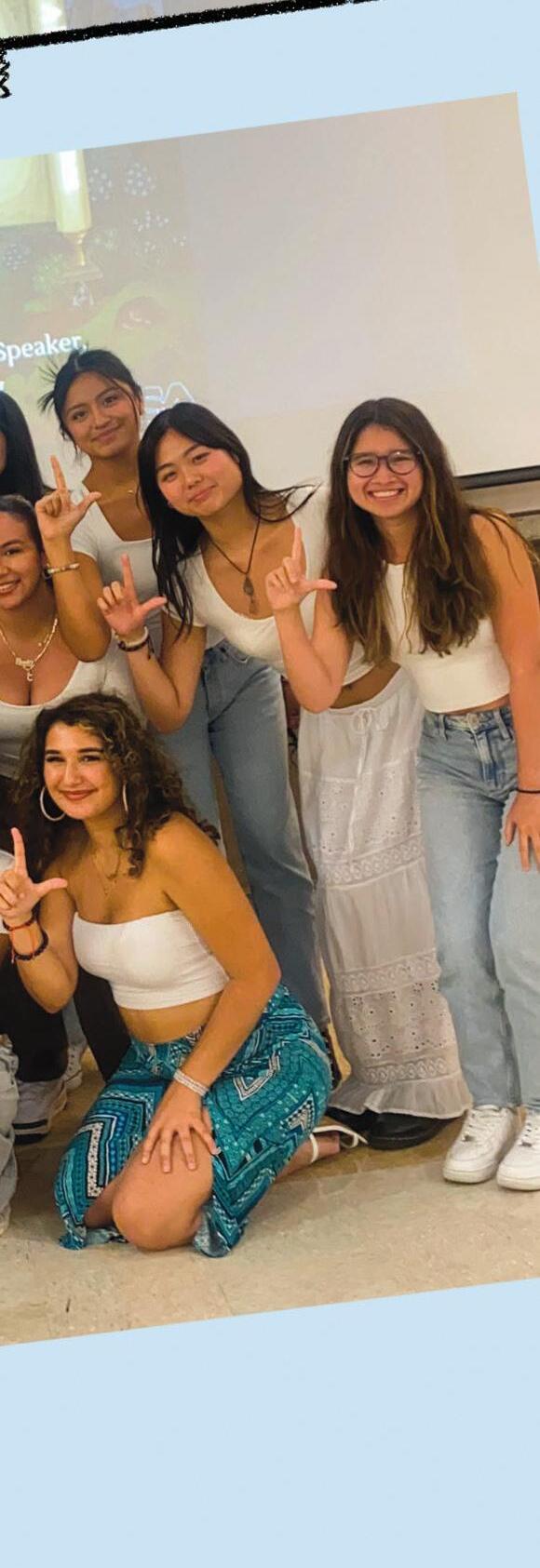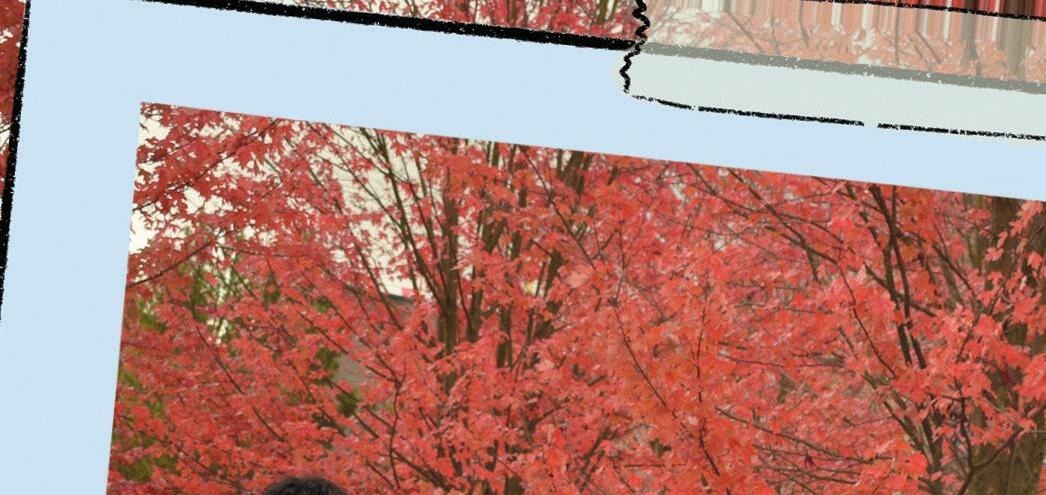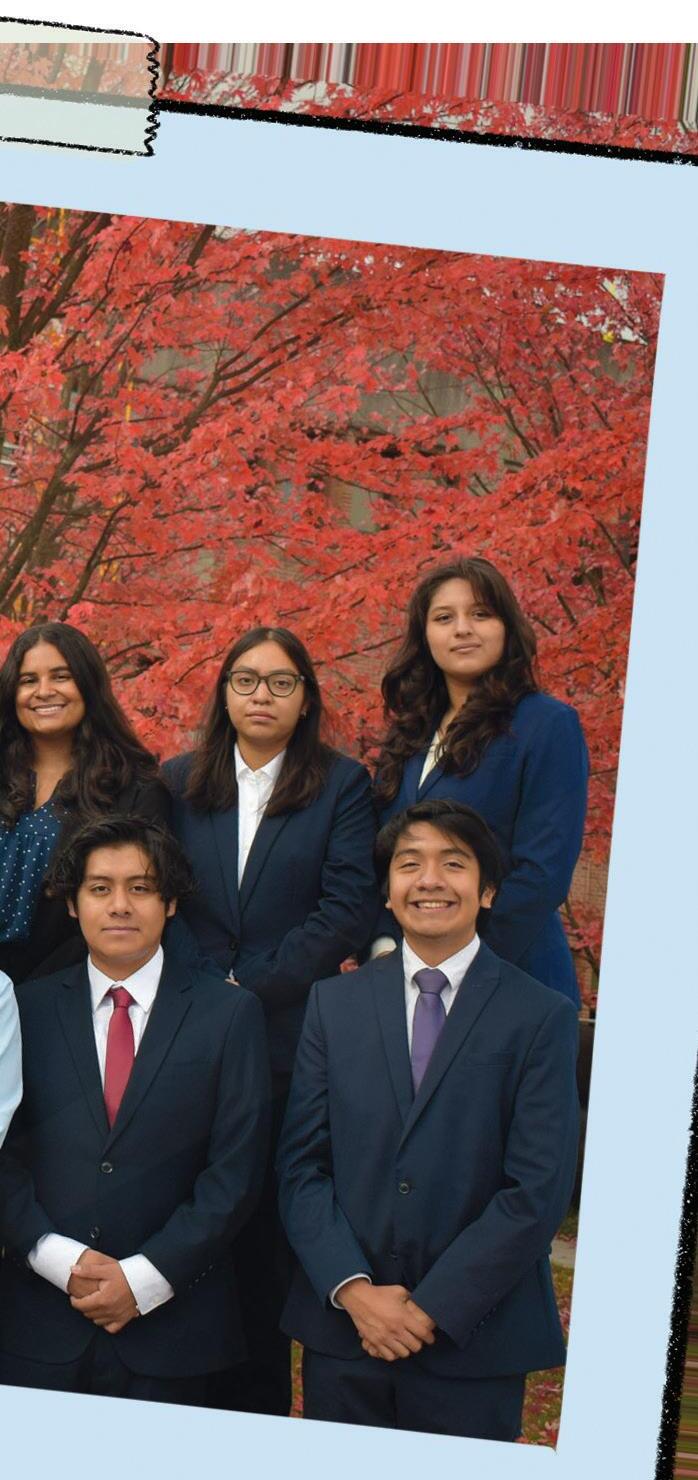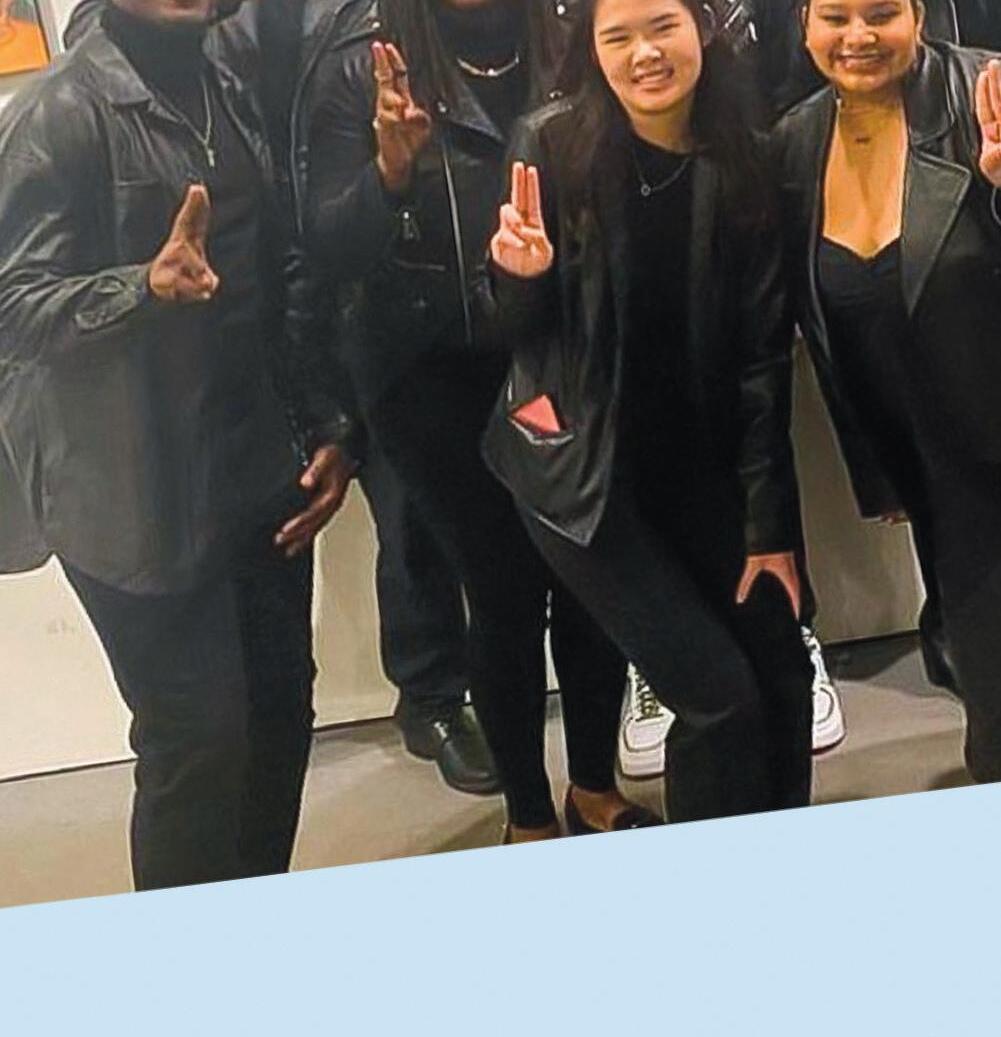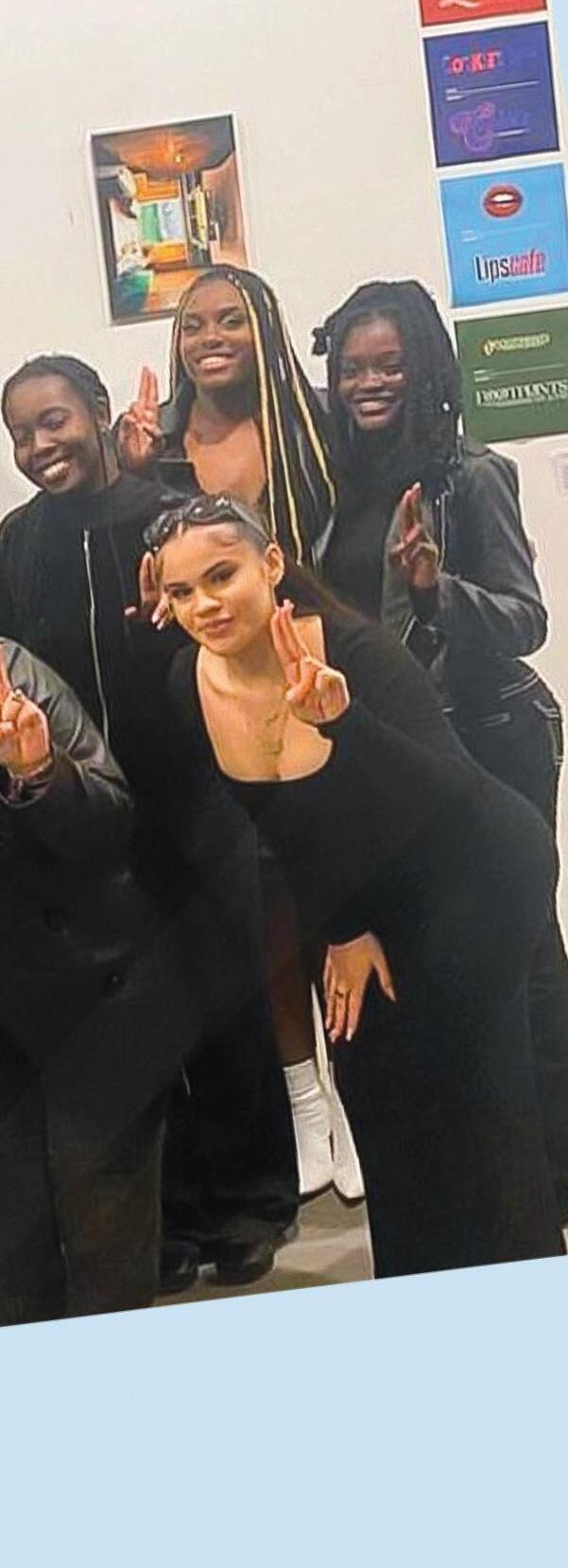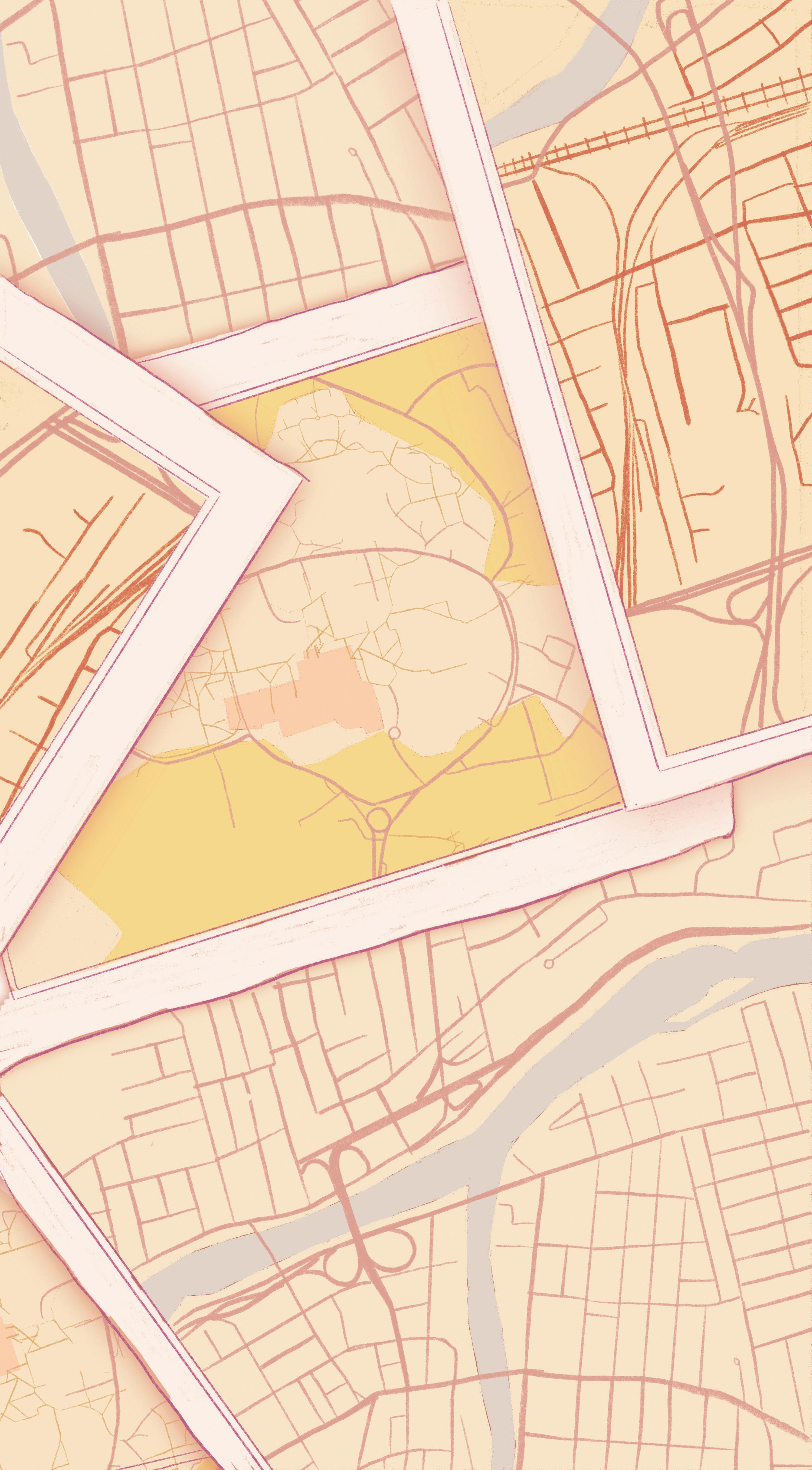












































































































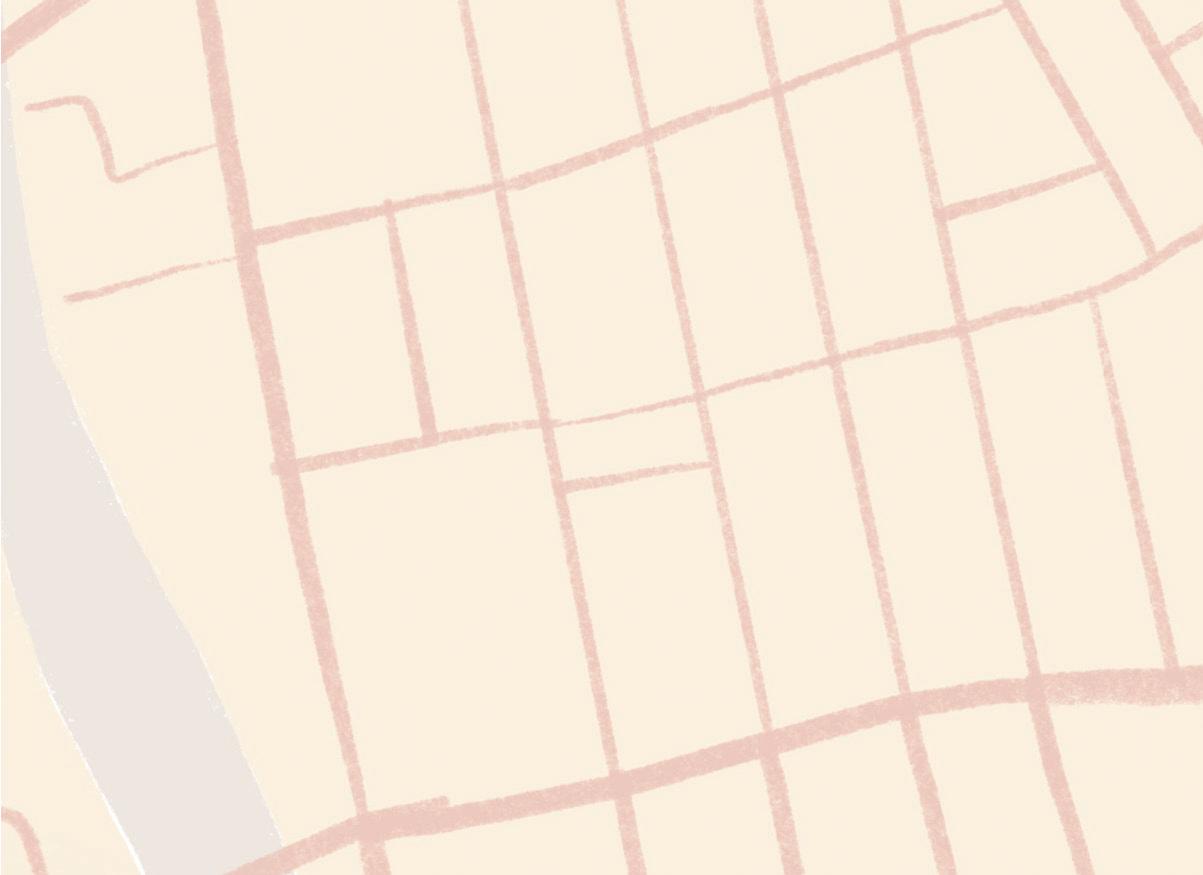

















































































































This semester, Pipe Dream’s Arts & Culture section launched our first-ever Multicultural Issue, spotlighting Binghamton University’s cultural organizations with the aim of fostering awareness and support of the cultural community on campus. Pipe Dream adheres to the Multicultural Resource Center’s definition of multicultural, which includes Cultural and affinity, LGBTQ+, Pre-professional and service, Cultural Greek, Religious and Performance groups, among others.



Beginning in late January, Pipe Dream collaborated with the vice president for multicultural affairs to invite multicultural organizations to be featured in this special issue. After reaching out to us directly, organizations had the option of choosing one type of article that they prefer — club features, previews of future events, guest columns or Q&A articles. There was a quota of 12 articles for the issue, decided on a first-come first-serve basis, to ensure that we cover the organizations as democratically and holistically as possible, with a focus on each organization’s voice while acknowledging Pipe Dream’s capacity for coverage.
We are grateful to have the opportunity of sharing the valuable work of all the multicultural organizations featured in this issue, and hope that readers gain insight into some of the robust multiculturalism that BU’s student groups have to offer.
If multicultural organizations are interested in coverage outside of Multicultural Issue, please contact arts@bupipedream.com with any inquiries.
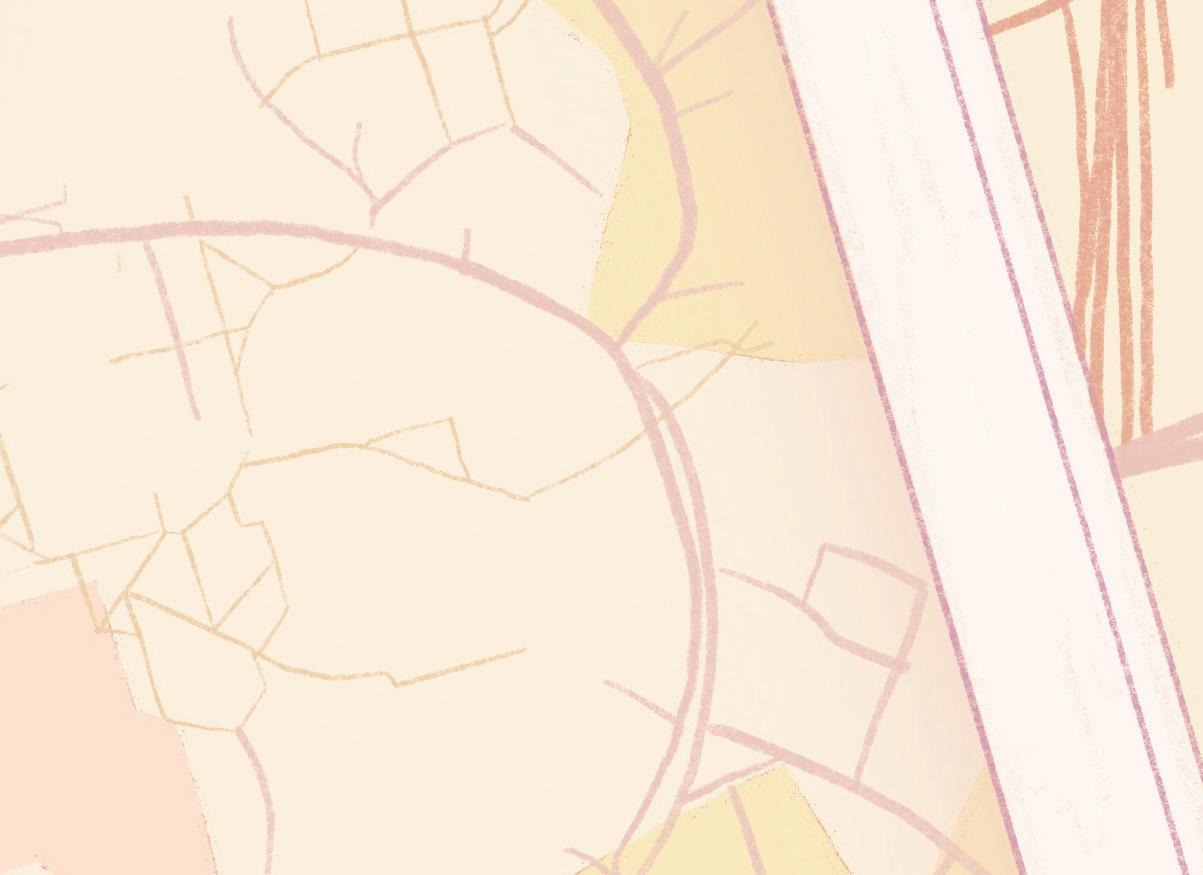


ASU maintains its core goals of highlighting cultural identity, traditions and breaking stereotypes.
Revati Gelda asst. arts & culture editor
Founded in 1987 at Binghamton University, Asian Student Union (ASU) is one of BU’s largest cultural organizations. An umbrella group for seven Asian American clubs including Asian Outlook (AO), Binghamton University Japanese Association (BUJA), Chinese American Student Union (CASU), Korean American Student Association (KASA), Philippine-American League (PAL), Taiwanese American Student Coalition (TASC) and Vietnamese Student Association (VSA), ASU aims to create a space for fostering and upholding cultural traditions for Asian and Asian American students at BU.
Caitlin Kuang, an event coordinator for ASU and a sophomore majoring in English, described what she hopes individuals take away from ASU’s events.
“I hope individuals leave with a fun experience,” Kuang wrote in an email.
“One where they can make friends, create something special and feel the sense of community fostered with ASU. I hope it makes people feel less alone in this huge
university and gives them something to look forward to each week.”
From more casual events such as onigiri making and DIY mini zen gardens to informative events such as discussions on Asian diaspora as well as highlighting Asian American women’s experiences, ASU incorporates a spectrum of opportunities for students to come together and learn about different facets of Asian culture.
Ari Jain, marketing chair for ASU and a sophomore double-majoring in computer science and mathematics, shared how he helps to spread awareness about Asian American culture at BU.
“I like to highlight how unique every single person is,” Jain wrote in an email. “One of my jobs as marketing chair is to run an ASU project called [Humans of Bing ASU], which highlights any member of the ASU community who is willing to fill out the form and put themselves out there. For me, joining ASU has been a great opportunity to learn about Asian culture through everyone else’s varying experiences, and also is the chance to express how unique every single person in our community is.”

provided by matthew santos
American cultures and traditions.
her favorite ASU traditions.
Jessica Sung, an advisor for ASU and junior majoring in political science, described how she hopes ASU continues to expand upon its inclusivity.
“I always enjoy it when we hold events about cultures that aren’t within our subgroups such as our Tibetan Art event last spring,” Sung wrote in an email. “I feel that it is important to highlight all Asian cultures, not just ones that are within our subgroups.”
One of ASU’s biggest events, Asian Night, strives to celebrate and create an environment for Asian and Asian American culture and traditions through a variety of performances. Past participating organizations have included Binghamton Bhangra, Binghamton Fujianese Union (FJU), Binghamton Taekwondo Club (TKD) and MODA. Jain described ASU’s reasoning behind holding such a large-scale event.
“It is pretty stressful, but more than that, Asian Night is incredibly exciting,” Jain wrote. “It feels powerful to have the creative freedom to make Asian Night transform and grow each year. [It] allows us to showcase all types of Asian culture and whoever is willing to further the goal of displaying the beauty of Asian performance and visual arts (through the recently added fashion show, for example) is always invited to join us.”
Kuang explained one of
“My favorite ASU tradition is Thank You Banquet,” Kuang wrote. “Thank You Banquet is an event hosted by ASU that showcases the highlights of [that] year from not only ASU but the subgroups as well. It celebrates everyone’s achievements and oftentimes makes people emotional, me included. I love reflecting and seeing how much has happened in the span of the year. It also really brings people together and makes them feel connected with one another.”
Jain described how he hopes to continue to refine Thank You Banquet and
have ASU be connected to the larger campus community.
“My future goals for ASU is to have more inclusivity at Thank You Banquet,” Jain wrote. “If possible, given enough budget, fundraising and careful planning, we can extend our events to more organizations, which would give us even more connections with even more talented and deeply involved people. My goal is to have ASU and our events be seen as a place of positive energy that anyone can come enjoy and be left with fulfillment afterward.”
munity.
BAMS provides a welcoming community, fostering representation, empowerment and diversity.
Brandon Ng news editor
Founded in 2002, the Binghamton University Association of Mixed Students (BAMS) continues to build and foster community for students with mixed-race backgrounds and heritage.
The organization’s core values are diversity, awareness, unity and empowerment, according to Caitlin Tucker, president of BAMS and a senior majoring in
environmental policy. She described the challenges BAMS’ founders experienced on campus, including belonging, navigating their identities and representation within existing multicultural groups on campus.
“While there may be other cultural or ethnic organizations on campus, BAMS provides a unique space for individuals with diverse backgrounds to come together, share their stories and support one another in navigating their identities,” Tucker wrote in an email. “BAMS serves as a bridge between different cultural groups, fostering understanding and unity among students from various backgrounds. It provides a platform for raising awareness
about the complexities of mixed heritage and advocating for the inclusion and representation of mixedrace and mixed-ethnicity individuals within the broader campus community.”
In 2023, the organization won the “Bridging the Gap” award at the Student Association President’s Dinner, an honor given for connecting and celebrating diverse communities.
Through general body events and collaborations with other campus groups, including the education minor and the Citizens’ Climate Lobby, BAMS celebrates cultural holidays, educates the campus community and provides a social space for students to connect and destress.
Both Tucker and Matthew Baker, the organization’s treasurer and a senior majoring in mechanical engineering, mentioned BAMS’s “Microaggressions: Diversity is Strength” event as a major success. The event centered around students sharing their experiences with microaggressions — everyday comments or actions that communicate a derogatory or negative message to another because of a group they belong to — as well as speakers and presentations, catered food and an open art gallery.
“This event helped spread awareness about microaggressions that people on campus have experienced and brought people from the multicultural community together,” Baker wrote in an email. “The planning for this event truly brought me out of my comfort zone and was the culmination of several months’ worth of work, most extensively with the [then-treasurer]. This work then helped me to serve as the treasurer this year to help BAMS flourish in the multicultural community.”
Kayleigh McGeeney, one of BAMS’s senior advisors and a senior double-majoring in mathematics and history, expanded on the organization’s growth during her involvement.
According to Cristaly Alfaro, one of the organization’s fundraisers and a junior double-majoring in sociology and Spanish, BAMS fundraises by holding events — including plant potting — that draw a crowd and allow its members to create a safe space for those looking for com -
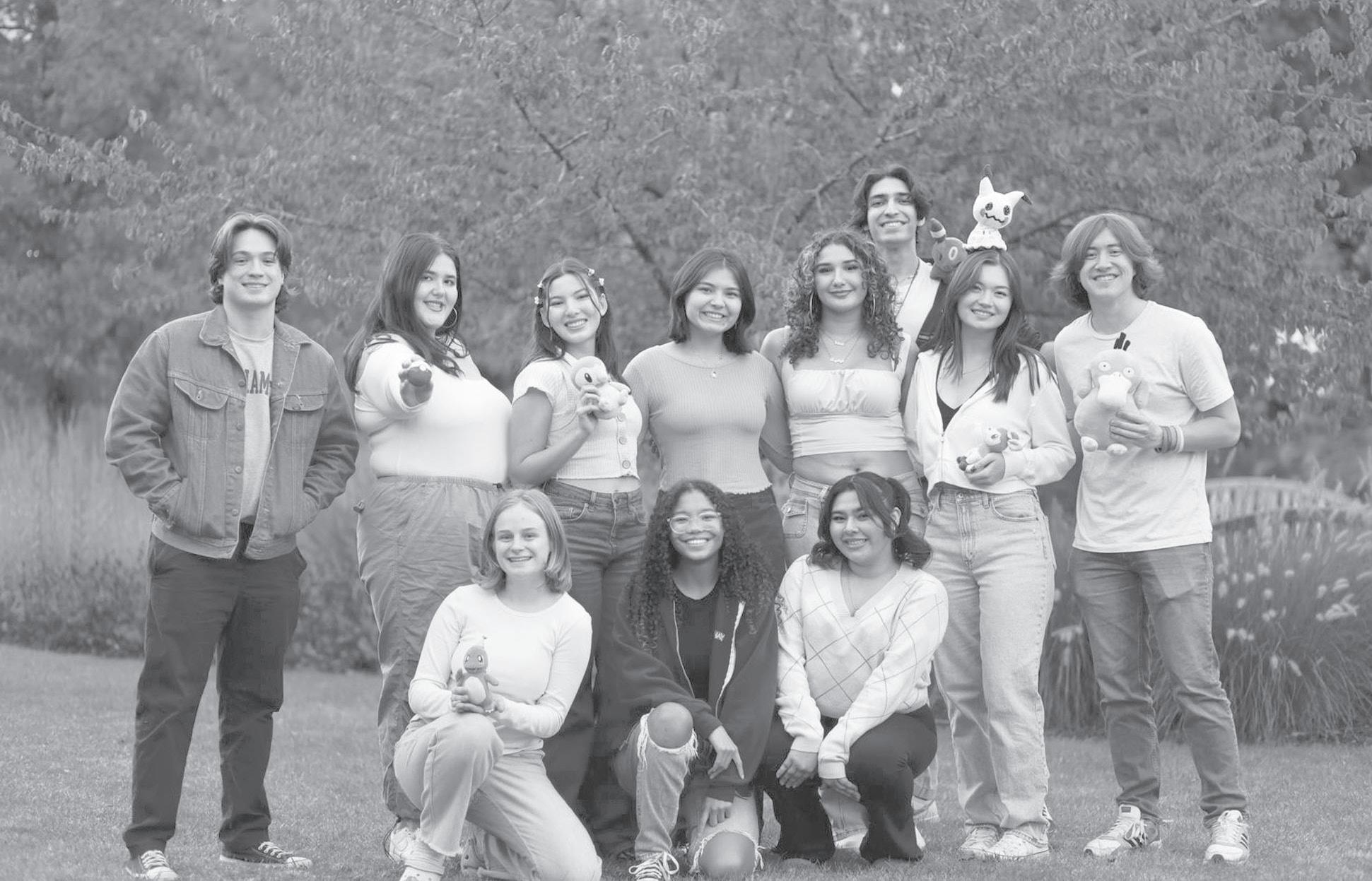
“When I first joined BAMS, we were a small organization, but now we have grown so much from what we used to be,” McGeeney wrote in an email. “I appreciate our dedication to having weekly meetings, and we even threw an event last year when I was president. I cannot wait to see how much BAMS will continue to grow.”
This year, BAMS events have included educating the campus community about xenophobia and racial profiling, a celebration of music from around the world, boba making, lantern making in observance of Lunar New Year and a discussion about inclusivity in media. The organization also participated in the SA vice president for student success’s “Chalk the Vote” event in November.
“It has been so incredibly rewarding to watch my E-Board grow and evolve throughout the years,” Tucker wrote. “Most of us are from different backgrounds, so we all have our own unique perspectives and experiences. When we get together to solve problems, brainstorm [and] show support, you can really see how special it is to be a part of a group made up of such diversity. Our goal is to spread this kind of acceptance and collaboration to the entire campus.”
Editor’s Note: Bella Daidone, Pipe Dream’s managing editor, is a senior advisor for BAMS. She was not involved in the writing of this article.
The Black Dance Repertoire (BDR) will perform in “Exposé,” their annual spring showcase on April 26.
Founded in 1985, BDR is a multi-racial and ethnic dance group that performs at various campus events. Each year, the organization showcases a wide range of dance genres including African, Modern, Latin, Hip Hop, Reggae and Jazz. This year’s show, held in the Mandela Room at 7 p.m., will be inspired by animation and the new Netflix live-action series “Avatar: The Last Airbender.”
Rachelle Bird, the president of BDR and a junior majoring in social work explained that the series’ storyline seemed like a perfect way to highlight their own stories through dance.
“This is BDR’s very own production where we showcase each of our genres to our beloved audience and supporters in the [Binghamton University] community,” Bird wrote in an email. “In between our own performances, we will have special performances by other performance groups and other crowd-interactive activities to keep our audience thoroughly entertained.”

Each of the dance genres will explore a different one of the four nations that exist in the show — the Water Tribe, Earth Kingdom, Fire Nation and Air Nomads. The performance will also explore the various subsets of other elements, including the incorporation of non-benders like the Kyoshi Warriors.
This year, the group will also perform a Kompa dance in the Latin genre, a “very intimate and modern méringue genre of dance,” originating in Haiti.
Crystal Mintah, the fundraising chair for BDR and a sophomore majoring in biology, emphasized that their two-hour a day rehearsals never feel that
long because they are so “family oriented.”
“Each member of the team is influential when it comes to creating choreography,” Mintah wrote in an email. “This way works best for us because everyone has unique and different ideas on how to bring the story to life through dance. Each member can make dances for whichever genres they feel comfortable in and teach them to the rest of the team.”
Exposé is a production showcasing each of the group’s genres to an audience and the BU community. The additional performances by other performance groups and activities will
keep the audience engaged and entertained throughout.
Last year, BDR centered their showcase around spring break, where different vacation destinations were explored through movement and dance genres. The year prior, the performance was jungle-themed, with each dance style representing a different animal found in the wild.
“While my academic stressors exist on my shoulders, being able to have a group of genuine people to gather with at the end of every day to do what we love is a true blessing and a relief,” Bird wrote. “Having dance as an outlet is something that I’ll
always be grateful for as a student because sometimes you just need that one thing you love doing to keep you motivated and enjoying your college experience.”
Bird explained that many may assume BDR is exclusive only to Black people. While their organization does perform styles primarily originated by Black people and people of color, they do encourage everybody to try out. They also emphasize that students of all levels of experience are welcome, providing them with a space to grow throughout their time on the team.
Jadesola Teriba, the vice
provided by
president of BDR and a junior double-majoring in psychology and philosophy, politics and law, explained that dance allows her to clear her head and find peace. She has also been able to try dance styles she never had experimented with before.
“Being a part of the team has allowed me to acquire a sense of belonging and happiness during my college experience,” Teriba wrote in an email. “It’s an art form because we are conveying our inner thoughts and emotions through our song choice and body movements we put into our pieces.”
Pipe Dream spoke with Rodriguez about the club’s origin, involvement on campus and future goals.
With Candela: Latin Dance Club having celebrated its first anniversary since its establishment in January 2023, it is now looking forward to further growth and improvement within the organization, now and in the near future. Cande-
la: Latin Dance Club hopes to establish a lasting legacy within the Binghamton community, as well as a sense of community and inclusivity among its members to further spread its philosophy and message that anyone can dance.
Pipe Dream interviewed Joskarly Fermin Rodriguez, co-public relations chair of Candela: Latin Dance Club and a senior majoring in Italian, to gain understanding of Candela: Latin Dance Club and the aspects that make up the organization. This interview has been edited for length and clarity.
Q: Tell me a bit about Candela: Latin Dance Club. What aspects make up the club?
A: Candela is a Latin dance club that is recreationally based. We strive to share our Latin culture through dance across all types of races, ethnicities and cultures, and we are inclusive for all levels of dance — beginners, intermediates, pros — it does not matter. We want to create a welcoming, supportive and inclusive environment for everyone to come to and to share in the joys that dancing can bring.
Q: Candela: Latin Dance Club was established last year around the beginning of 2023. What inspired the creation and establishment of Candela: Latin Dance Club?
A: Our main founders had a history of performing, and they felt that they still wanted to be a part of the dance community but at a smaller scale, in a way that was a lot less competitive and so Candela was born. We have a lot of people who come to the meetings who feel disconnected from their culture, and they want to be integrated back into it,
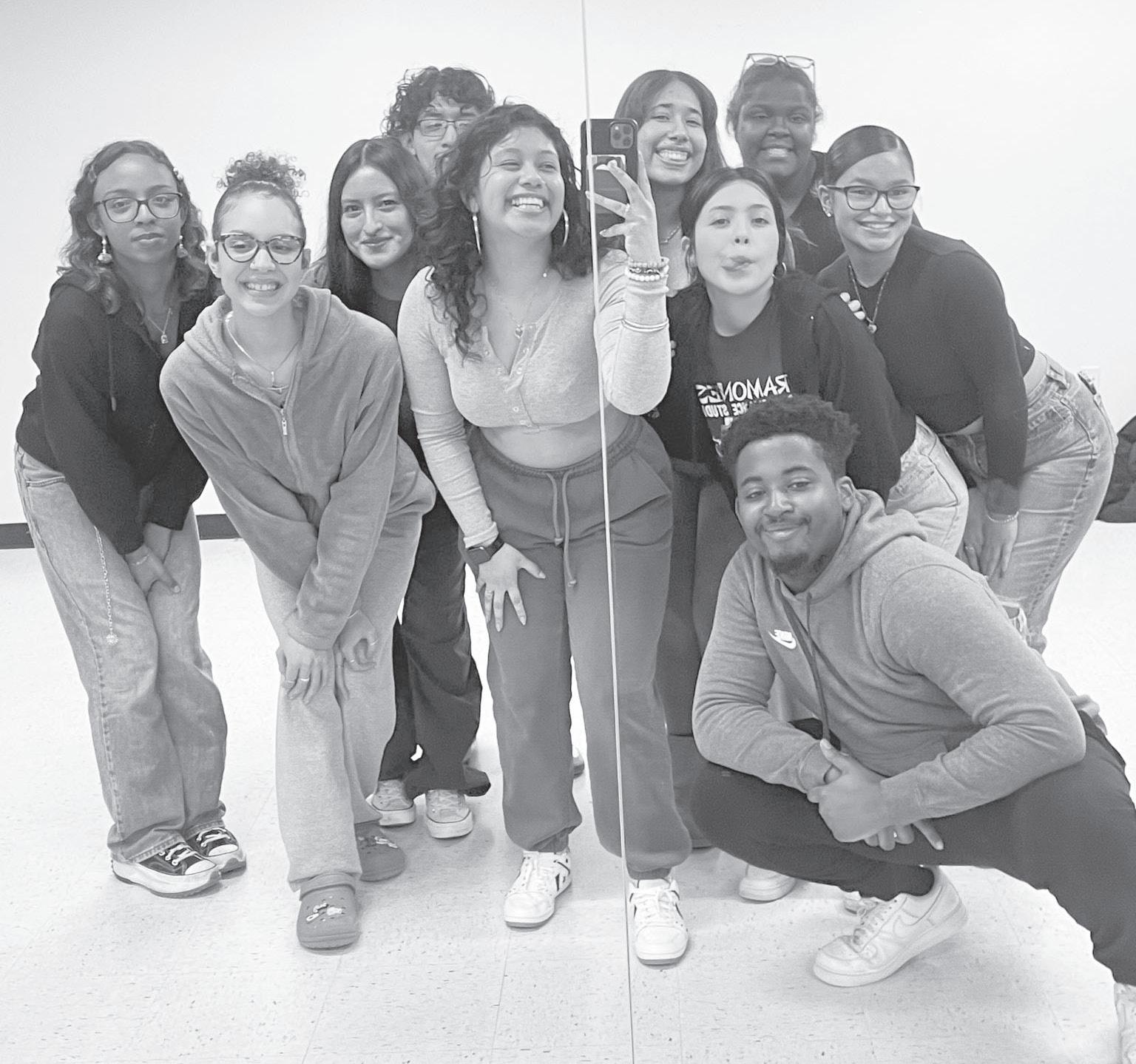
so we offer that friendly and welcoming atmosphere that makes them want to return.
Q: How does Candela: Latin Dance Club get involved with the rest of the multicultural community on campus?
A: How do we not get involved is the answer, honestly. We are everywhere all at once. We do a lot of collaborations with other organizations, such as Latin American Student Union (LASU), Quimbamba Latin Dance Team and Society of Hispanic Professional Engineers (SHPE). We aim to be friendly with all organizations on campus, and so we don’t hold back. Our point is that we are open to any collaborations. If our E-Board feels like it is something we should do and try, we do it.
Q: How does Candela: Latin Dance Club help build a strong community within the organization? How do you get students to become more involved with your organization?
A: Honestly, our organization builds community through word of mouth. We strongly suggest and encourage people to come to our workshops and join Candela. We have our weekly intern practices, in which the E-Board teaches that week’s choreography. When we have workshops, and [when] we have people pop in and check out what we are doing, I encourage them to join. We post a lot on our Instagram stories, and we just do outreach whenever we can. We build a strong sense of community within the organization by staying consistent.
Q: What goals, short and long-term, does Candela: Latin Dance Club have for the rest of the semester?
A: Outreach has always been our biggest goal. We try
to get our name out there and get as many people as we possibly can to come to our dance workshops. We want to pave a long-standing relationship and build a strong legacy with the Binghamton student community for years to come, and to have our overall philosophy of having a safe and fun environment to dance to be understood by the community and have it last. For now, we are focusing on broadening our horizons when it comes to the dances we do. Instead of just doing cumbia and bachata at our workshops, we would like to begin to incorporate flamenco and tango for people to try.
Q: I see that you are the co-public relations chair of Candela: Latin Dance Club. Can you explain what your role is and what motivated you to join Candela in the first place? What have you learned from your role?
A: I have been a part of Candela since 2023, from the moment it was founded. As a transfer student, it was hard to make friends when I arrived, and having something that connected me to a community on campus helped me flourish. Having the support of my co-public relations chair definitely makes it easier to manage the job, as the connection we have allows us to be more creative with our ideas and how we do outreach. Now that we are an established organization on campus, I am just amazed and proud of all the hard work that our E-Board has put in the last year to get us to where we are now. Within one year, we figured out a system for how we do things that work for all of us, and it feels like we now have an established community. Students should definitely keep an eye out for us because we have a lot of exciting things planned.
Chabad at Binghamton prepares for their annual, student-wide Shabbat dinner with a goal of 2400 attendees.
Hudson Burrows asst. arts & culture editor
The largest Shabbat dinner held on any college campus nationally is about to get even larger. Shabbat 2000, a campus-wide Shabbat dinner, will now become Shabbat 2400, as the attendee goal has reached a record high. Chabad at Binghamton will host their 30th-annual Shabbat 2000 — now Shabbat 2400 — April 5 at 6 p.m. in the Events Center.
This renowned Jewish event takes place at various other colleges across the country, but what makes it particularly special for Binghamton students is its Binghamton University origin. Shabbat 2400 has grown exponentially over the years with each year surpassing the last (2), making for a much anticipated event for the Jewish community.
Michal Levine, major programs coordinator of Chabad at BU and a junior majoring in Judaic studies, conveyed the event’s significance as well as its impact throughout the larger Binghamton community.
“Shabbat 2400 started 30 years ago in 1994 here in Binghamton as Shabbat 500 and has now expanded into a worldwide event replicated on many other college campuses,”
Henna Club celebrates the artistic tradition, heritage and selfexpression of henna through their community events.
Tresa Karnati asst. news editor
Henna Club aims to foster community and creativity through an important cultural art form.
Founded in late February of 2023, Henna Club hosts events and workshops which teach participants how to make designs using henna paste, a natural dye made from the henna plant. The reddish-orange stain henna creates is due to lawsone, a molecule found in the leaves and stems of the plant that binds to proteins in the skin and hair. The club sources natural organic henna paste from a vendor to ensure that their
Levine wrote in an email. “It’s amazing to see how the Jewish community of Binghamton has grown and been able to make such an impact on the larger community as a whole. The inspiration behind having such a large Shabbat dinner is to come together as a community, both Jewish and non-Jewish students, eat a meal and grow an appreciation for each other and our different backgrounds and traditions.”
Beyond reaching new heights when it comes to the number of attendees, Nora Monasheri, secretary of the Chabad at Binghamton and a first-year graduate student studying business administration, delved into why this year’s Shabbat 2400 is especially important for the Jewish community.
“Every year, we look to make it bigger and better than the year before,” Monasheri wrote in an email. “Since Oct. 7, the events of the massacre ignited a level of Jewish solidarity like never before. This year, more than ever, Jewish unity is stronger and needed. I hope students get to see that they have a community of students there for them, whenever and wherever.”
Shabbat 2400 welcomes students from all types of faiths and backgrounds, encouraging a holistic and inclusive celebration of such a prevalent Jewish tradition. Avi Gordon, a Shabbat 2400 spearhead and a freshman majoring in business administration, further explained the cultural outreach of Shabbat 2400.
events are safe and accessible for all students. Through these events, participants not only express themselves through their work, but also engage with an array of techniques used by communities around the world.
Sumaita Nazifa, co-president of Henna Club and a senior majoring in English, described how a gathering they held inspired the group’s creation.
“I had extra cones lying around and decided to have an impromptu henna night before the Pakistani Student Association’s Mock Shaadi event, as henna is commonly done on not just the bride before weddings, but the guests as well,” Nazifa wrote in an email. “It was some of our members’ first time getting their henna done, and we got to watch them fall in love with the process, and even pick up a cone to practice the art form themselves. It was the first

“Shabbat 2400 brings lots of attention and shows the outside world that the Jewish community stands strong and proud, not afraid to gather and practice our religion with both old and new friends,” Gordon wrote in an email. “It is an opportunity to give the rest of the world a view into Jewish culture and to show them how full of light, dancing and joy it is.”
Beginning at sunset every Friday — the seventh day of the Jewish week — and ending the following sundown, Shabbat is the Jewish day of rest where no work is to be done by those observing. The day involves customs to varying degrees, all of which contribute to Shabbat’s restful purpose and an overarching celebration of Judaism.
Levine described one of the more traditional components of Shabbat, which is a practice having to do with abstaining from electronic usage.
“Shabbat is rich with Jewish tradition and what’s so unique about it is that everyone has their own way of celebrating it,” Levine wrote. “Traditionally, one takes a step back from the world and turns off their phones for the 25 hour period and spends their time at prayer services, eating meals and spending quality time with friends and family.”
Haley Wilenzick, a Shabbat 2400 spearhead and a sophomore majoring in integrative neuroscience, hinted at some more Shabbat traditions that students can anticipate for this
time we all felt connected to each other in such a creative way.”
The practice of using henna to stain hands, feet or hair is common in many parts of the world.
Haridra Jariwala, the club’s cultural chair and a senior majoring in biology, acknowledged the use of henna in South Asia, Africa, The Middle East and diasporic communities around the globe. She explained how their organization works to incorporate various cultural traditions into their work.
“With such vast diversity of this art form, we as an organization try to incorporate it in our events [to be] as inclusive as possible,” Jariwala wrote in an email. “For instance, we collaborate with different organizations on campus like the Bengali Students Association (BSA), Indian International Student’s Union (IISU), Caribbean Students
Association (CSA) and many more that expose our general body to different styles and cross-cultural understanding of traditions. We also host Henna Workshops that aim to teach our general body various styles and patterns from different origins.”
The club also hosts themed events, like Hennaween, where participants can get gothic inspired henna, and Match Made in Mehndi, an event with Valentine’s Day-themed designs. Their upcoming World Runway fashion show will take place on April 6 from 8 p.m. to 10 p.m. The event will include general body members and students from other organizations modeling henna designs from different cultures.
Ashley Varghese, the social chair of the club and a junior majoring in political science, described the impact the club hopes to have on the BU community.
“Through the unique art
year’s big event.
“Traditional Jewish foods like Challah and Matzo ball soup are central to the Shabbat dinner experience — students can try these foods and other traditional foods at the event,” Wilenzick wrote in an email.
“Shabbat practices like lighting candles and singing specific prayers will also play a part … The experience will highlight Jewish foods, traditions and customs, encouraging meaningful interactions and community bonding.”
With the big day less than a month away, members of Chabad and the greater Jewish community are gearing up to make Shabbat 2400 the largest, most festive Shabbat to date.
Hannah Kirsch, a Shabbatform of henna, we hope to make the Binghamton community a little more connected,” Varghese wrote in an email. “Since henna is prevalent in so many different cultures, we have been able to collaborate with a variety of student organizations. In fact, our upcoming Fashion Show will feature numerous student organizations, and we look forward to showcasing and appreciating different cultures and identities through unique henna designs. Henna is an art for everyone to enjoy, and we cannot wait to educate more people about the history and cultural significance of henna while providing them with a way to express themselves.”
Saanvi Shah, the club’s secretary and a junior majoring in biology, explained the importance of henna as a form of self-expression stemming from “centuries of artistic evolution and cultural significance” in South Asia, the
2400 spearhead and a senior majoring in psychology, shared what Shabbat means to her as well as what she hopes students take away from attending Shabbat 2400.
“I hope more people walk away with an understanding of what Shabbat is and why it is so important and loved in Jewish tradition,” Kirsch wrote in an email. “To me, Shabbat 2400 is a way to show students more about Shabbat, which is my favorite day of the week. It adds an element of spirituality to my life that I am so grateful for, and I hope all attendees, Jewish or not, can appreciate that and learn more about Judaism through that lens.”
Middle East and North Africa. She went on to emphasize the communal aspects of henna and its ability to bridge old and new traditions.
“Henna is deeply intertwined with rituals, celebrations and rites of passage, making it a vital part of cultural identity and heritage,” Shah wrote in an email. “The act of applying henna is often accompanied by communal gatherings and shared stories, fostering a sense of belonging and connection. Additionally, henna’s temporary nature allows for experimentation without permanent commitment, encouraging individuals to explore different designs and themes freely. Thus, henna emerges as a powerful form of self-expression, bridging tradition with modernity and providing a platform for individuals to showcase their identity, creativity and cultural pride.”




JUMP Nation will be hosting their annual JUMP Weekend as part of their mission to help at-risk students.
The Juvenile Urban Multicultural Program (JUMP Nation) is set to hold JUMP Weekend at Binghamton University.
JUMP Nation — founded in 1991 by BU students with a mission to decrease high school dropout rates through mentoring and increase student enrollment — has hosted JUMP Weekend every year. The event involves bringing middle school students from New York City, or proteges, up to BU for an all-expenses paid weekend with various forums and workshops to show the opportunities that post-secondary education has to offer. Proteges are paired with student mentors to guide them through the weekend and beyond, providing college advice and support.
Daisy Calvario, co-public relations chair for JUMP and a junior majoring in human development, described how the students participating in the weekend are chosen.
“The middle school students participating in this year’s event are chosen by what we call ‘at-risk students,’” Calvario wrote in an email. “At-risk is a term we use to identify students who experience problems in school, at home or have experienced personal tragedies. We look for students who believe their current situation does not make college a valid option, so we may show them that college is possible.”
Commencing on March 21, this year’s JUMP Weekend will consist of various activities for the proteges to take part in — including football and basketball games, writing workshops, a talent show and other meetings and events in relation with different multicultural organizations on campus. The proteges will be staying on campus with students who signed up to host them for the weekend.
Calvario highlighted a few of the other events that the organization hosts for JUMP Weekend, as well as some of her favorites.
“Some of our events for JUMP Weekend vary from roller skating to college admission workshops to selfcare activities,” Calvario wrote. “One of my personal favorites is Sister to Hermana, Brother to Hermano and Safe Space, where eighth
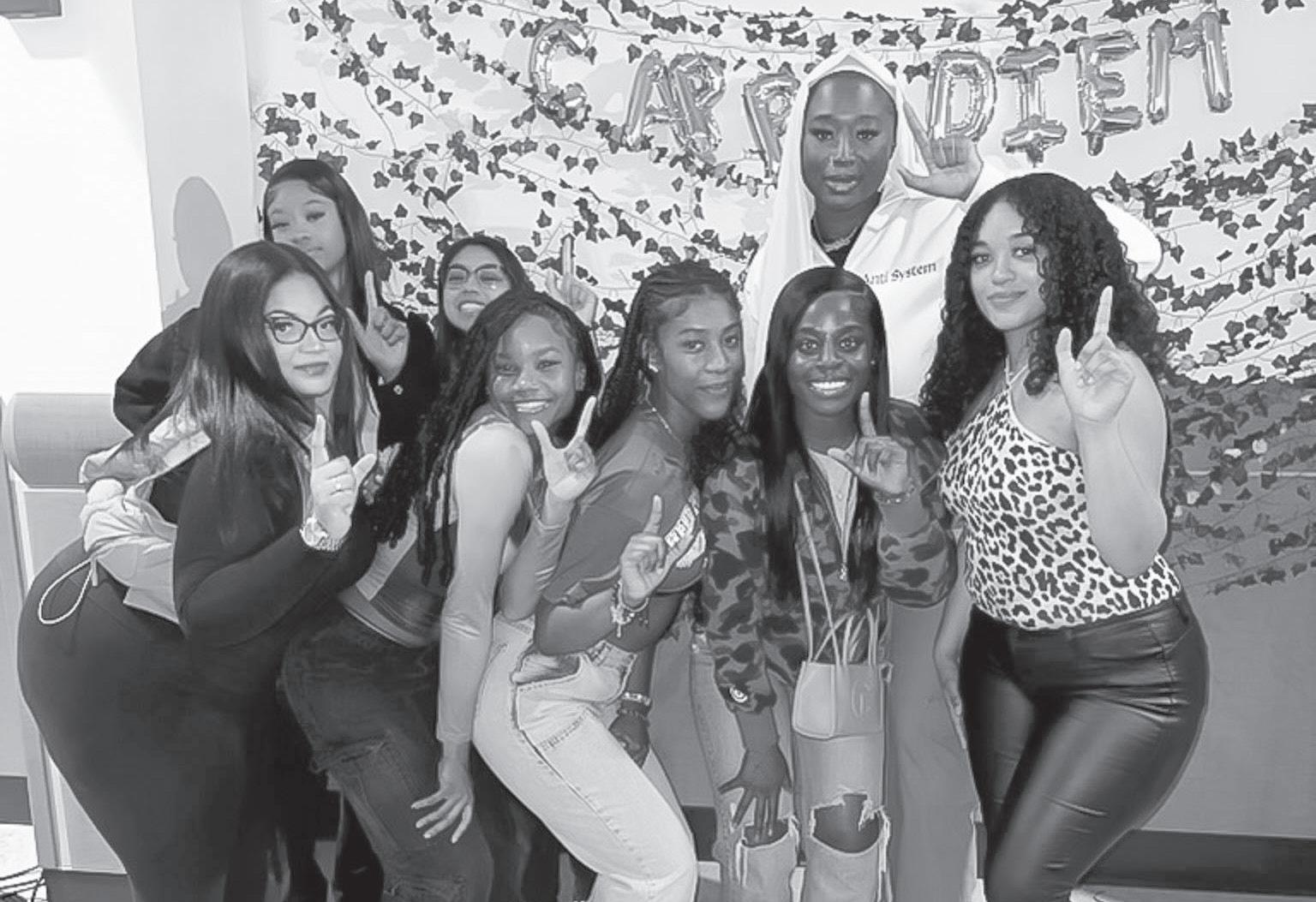
graders have a supportive environment to share and bond with both their peers and mentors.”
JUMP Weekend is the organization’s biggest event, and requires BU student hosts and mentors to make it a success. Student involvement aids in creating a supportive and encouraging network of people to help the proteges overcome various obstacles throughout their high school careers.
Madyson Rodriguez, part of JUMP’s mentoring committee and a sophomore majoring in linguistics, expressed the importance of being a mentor for JUMP Weekend.
“It is important that BU students are mentors [and] hosts for JUMP Weekend because in a way you’re saving the youth,” Rodriguez wrote in an email. “The proteges come from communities that most likely don’t
promote the idea of going to college or staying in high school. But going to college is very important and staying in school is as well … overall, signing up to be a mentor is a way of giving back to the community and a way to inspire the youth.”
Calvario discussed what the organization hopes the proteges will take away from JUMP Weekend.
“We hope the eighth grade students, proteges,
learn more about college and are able to see how people from similar backgrounds, like them, have made it,” Calvario wrote. “We also hope they build the connection with their mentors/hosts, and walk away with a support system who will be there to help them wherever they need it. We hope to inspire them to achieve higher education.”
Pipe Dream interviewed Gonzalez to discuss the club’s goals, initiatives and connection to the campus community.
Bella Daidone Managing editorCarla Gonzalez is the publications chair for the Latin American Student Union (LASU) and a junior majoring in economics.
Pipe Dream interviewed Gonzalez about LASU’s values, initiatives, activism and her experience being involved in LASU.
This interview has been edited for length and clarity.
Q: Can you give me an overview of LASU, and what your core values are?
A:. LASU stands for Latin
American Student Union. Our organization promotes a sense of community for the Latinx community on campus. LASU teaches students about problems faced in Latin America and the culture in general. We organize cultural, political, social and educational events every Thursday.
Q: What drew you to join LASU?
A: My freshman year I was really feeling lonely because I was always surrounded by my Hispanic community back home. Coming to Binghamton was a culture shock. So during [Binghamton University] Fest, I found out about LASU, and they were really welcoming and friendly. They told me about what they do as an organization on campus and that drew me, and I started going to the general body meetings (GBs) and events. I really liked it because I
felt closer to home, closer to my culture and met new people. After that I did the internship over the spring semester to see how the organization works behind the scenes. I really loved it and then decided to run for E-Board because I wanted to create that safe space for students too.
Q: How do LASU’s values translate to the events and activities you host?
A: In our GBs you can see the values translated. For example, last week LASU hosted a GB called “Corruption in Latin America” where we addressed the political situations in different countries in Latin America such as Ecuador and Haiti since a lot of people are not aware of what is going on there. We provided the historical background and a deeper discussion so people have a better understanding of what is happening in those countries. We also host “Pal-
abras” which is our biannual event inspired by the Nuyorican Cafe with an open-mic format. We strive to provide an open space for students of color to showcase their art in whatever form it may come. We also hoped to highlight the immeasurable talent that exists within our community and strengthen our bond through the beautifulness of art. There is also a chance to win a scholarship, and it’s really fun, so I highly recommend participating.
Q: What is an initiative or event that you host that you think deserves to be highlighted or recognized more?
A: Our Nuestra Belleza y Nuestro Galán Pageant, which is happening this semester so I highly recommend everyone to go — it’s free. Basically, each contestant is assigned a Latin American country to represent. They learn about the cultur-

al aspects of that country, and there will be performances you see from that. It’s an educational and fun way for the contestants and the public to learn about the countries, costumes and culture of Latin America. I highly recommend going to Pageant.
Q: Is Pageant part of Latin Weekend and do you want to speak more about that?
A: Yes, it is part of Latin Weekend. First we start with Pageant, then Quimbamba has El Polvorín, which is a dance competition and then on Sunday the National Association of Latino Fraternal Organizations (NALFO) hosts a showcase. So that is the breakdown of the three-day weekend.
Q: Can you speak about LASU’s political activism on campus and online?
A: LASU always tries to be on top of political issues that come about because they were created by students inspired by the activist group the Young Lords. In the past, LASU has been at the center of protests here on campus — specifically, for Professor Candela and, a while back, for [the] Turning Point USA tabling. It is important that as an organization we show up for the students and faculty here that face these hardships. It is also important to educate because it all starts by educating your audience. Our political coordinator has weekly posts centered around Latin Politics and the Latine community. In order to serve all students it is crucial that we stand up for all colonized and marginalized voices, not just in Latin America.
Q: In what ways are alumni involved in LASU?
A: LASU has a strong connection with alumni. We value their input to the organization.
Every time that we have an event, they are always invited. They always come to Binghamton to support us. Over the summer and winter we have alumni reunions where we
hang out with them, and it’s a great time to bond and reconnect with them.
Q: What was your favorite event that you planned and what did the planning process look like?
A: Last semester, we had our 54th-annual banquet that was themed “Planeta de Amor,” which translates to “Planet of Love.” It involves a lot of planning. We started planning over the summer and worked on it until the end of October and the day of the event. We brainstormed how we would decorate the venue according to the theme, which artist would perform and the food. We assigned different tasks to E-Board members to make things run more smoothly, and it was really successful.
Q: Can you tell me about your position as publications chair and what that entails?
A: Publications is in charge of making a magazine per semester. I also do biweekly posts called Sabado de Sabiduria where we highlight artists or people in the Latine culture or give fun facts about the community. Last semester for the magazine, I did Cuisine around the world. We invited some orgs like the African Student Organization (ASO) and the Vietnamese Student Association (VSA) to collaborate in our publication and share the history of their cuisine. The theme for this semester is how people start losing and not embracing their native language due to trying to fit in the American society. I feel that it’s very important that we embrace that part of ourselves so that is why I wanted to do this topic. I would like to invite organizations on campus and the public to submit articles so it can be featured in the magazine. If people have any questions they can email or DM us on Instagram (@lasu_1969).
To learn more about LASU, email them at lasu@binghamtonsa.org or check out their instagram, @lasu_1969.
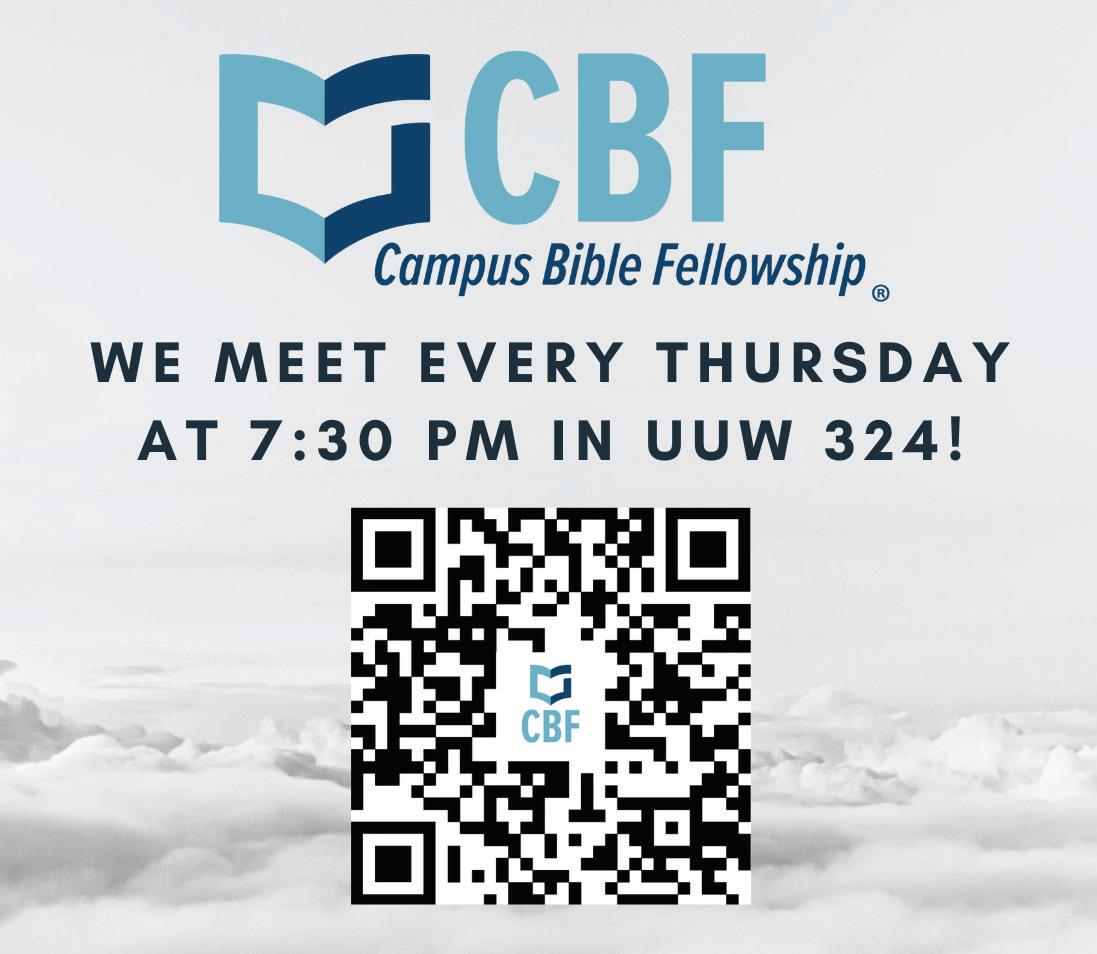


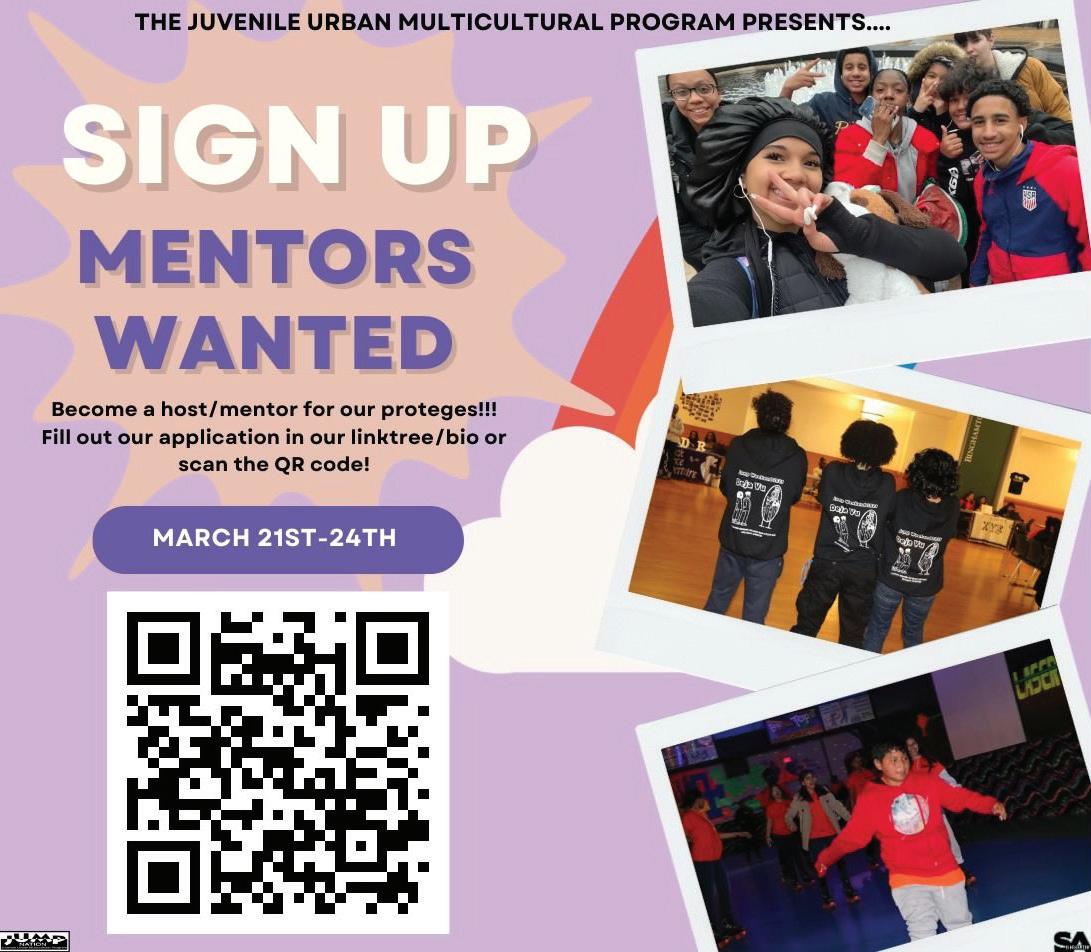

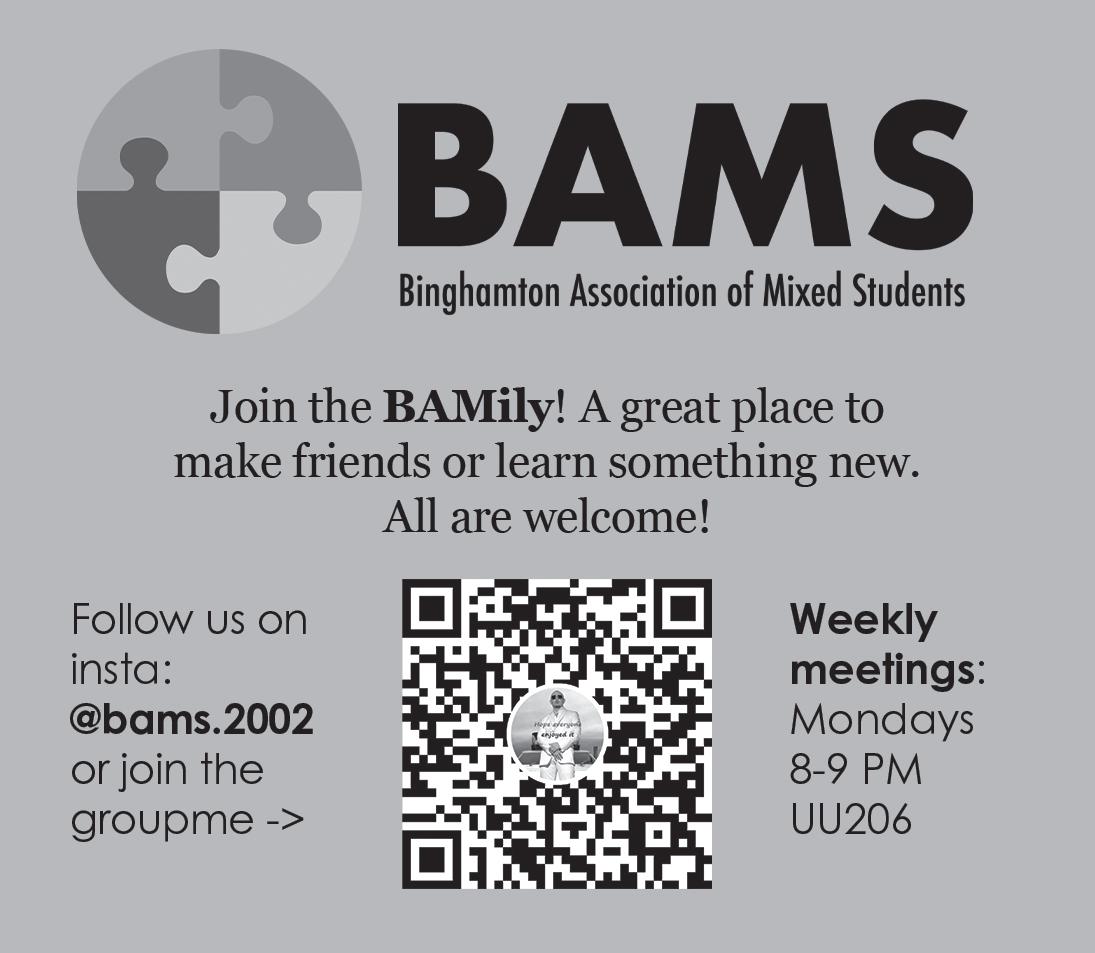

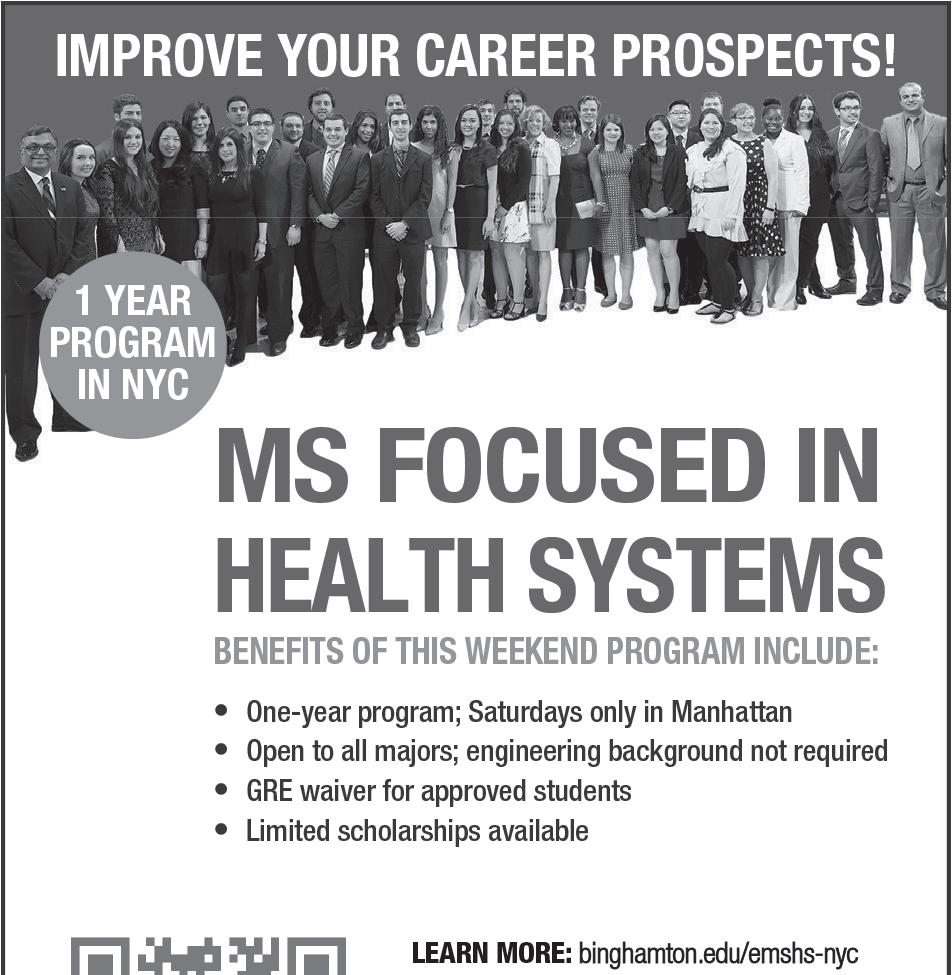

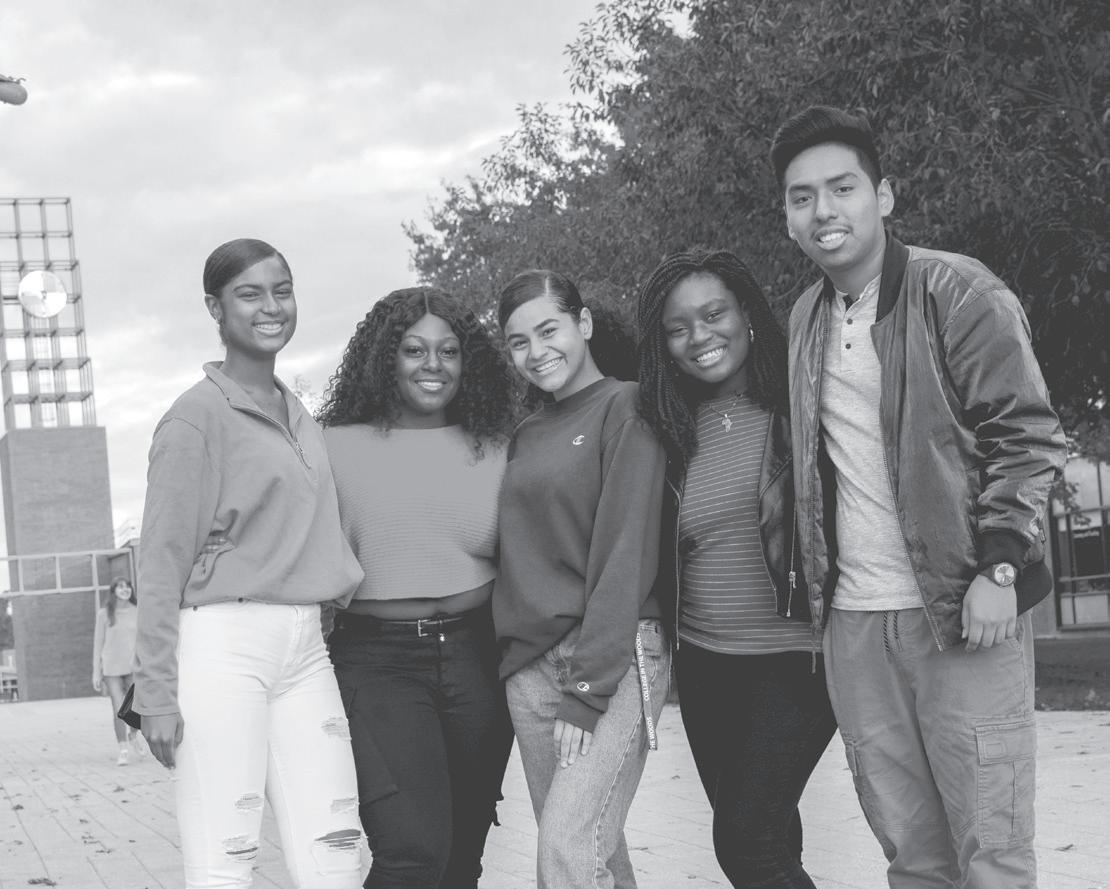
Deadline:

Binghamton students may search for opportunities, such as the George Floyd Scholarship for Social Change, and apply at binghamton.academicworks.com.


oSTEM fosters an inclusive environment for members of the LGBTQIA+ community who are interested in STEM.
Alexis Yang arts & culture editor
Out in Science, Technology, Engineering and Mathematics (oSTEM) at Binghamton University provides an empowering and welcoming community for students who identify as members of the LGBTQIA+ community and are interested in pursuing professional development in science, mathematics, engineering and technology (STEM).
oSTEM is BU’s chapter of the national, nonprofit professional organization of the same name. The University’s chapter was established in 2021, joining over 100 professional and collegiate chapters around the United States and internationally.
Sasha Shablovsky, vice president of oSTEM and a junior majoring in mechanical engineering, emphasized community as an important aspect of the organization. They described oSTEM as a safe space for LGBTQIA+ students, as the organization fosters a welcoming environment for people of all sexualities and genders.
“oSTEM is all about finding a community when working toward a career that traditionally may not be very diverse,” Shablovsky wrote in an email. “oSTEM is a national organization that is focused on creat-
ing and growing a supportive community for all LGBTQIA+ individuals pursuing careers in a STEM field.”
oSTEM strives to achieve this goal through their educational programming and social community-building events. Past events have included resume and career workshops, queer Jeopardy with the Rainbow Pride Union, Transcend and Keshet, social events and the oSTEM speaker series. Past guests for the speaker series were Owen Gilbo, equal opportunity specialist at the New York State Office of Parks, Recreation and Historic Preservation and Aviva Friedman, BU ’14 and 4th District Binghamton City Council representative. oSTEM has also participated in the 2022 oSTEM national conference in Boston, which provided professional and networking opportunities.
Shablovsky described some of oSTEM’s noteworthy events, as well as their favorite programming that the chapter has organized so far.
“Some notable events include the networking workshop where members of our E-Board helped students prepare for upcoming career fairs, [and] Gayme Night where members of our club were able to get together and destress with board games and friends,” Shablovsky wrote. “[The most memorable event was] making elephant toothpaste on the spine which was a hands-on activity that anyone was welcome to participate in. This moment stands out to me because it exemplified the fun and engaging elements of

oSTEM while being an educational and collaborative opportunity.”
Reflecting on the spring semester and looking forward toward the end of the academic year, oSTEM has more events in store for professional development and community bonding. Emily Leighton, public relations chair for oSTEM and a junior majoring in mathematics, provided her perspective on some of oSTEM’s past and future events.
“I’m really proud of some of the spring 2024 projects we have in store,” Leighton wrote in an email. “We hosted an elevator pitch and networking workshop to discuss professional clothing, [and] appropriate topics … We also have social events such as our Mario Kart/Super Smash Bros tournament we hosted back in February. Don’t forget to catch us at Spring Fling for elephant toothpaste. I’m extremely proud of this E-Board for creating such a fun, but also educational environment.”
As a student organization, oSTEM fosters an environment of support, camaraderie and growth for its members, according to Leighton. “I would describe the oSTEM community as tight-knit,” Leighton wrote. “We may be small, but we are mighty. It’s refreshing to be around such diverse, yet like-minded people, and I feel like that makes us unique. We have both a support system for each other mentally, but also educationally. I know if I have a question, someone will be able to give advice.”
Leighton and Shablovsky also discussed their respective E-Board positions and what oSTEM means to them personally. For Shablovsky, the role of vice president involves event planning and communicating with both members of oSTEM and the larger university.
“I love my role as it allows me to directly contribute to the growth of our club,” Shablovsky wrote. “STEM classes can be a real struggle and having people with shared experience and who can provide support is so helpful. This club provides a space for people to connect through that, and I find that very meaningful.”
For Leighton, their role as public relations is one that they truly enjoy. In addition to their public relations work, Leighton
also conveyed how the association’s vital and compelling vision inspired her to join oSTEM.
“I get to express myself through the posters and hopefully convey the tone of each event through the design of each post,” Leighton wrote. “The vision of the organization is the reason I joined the club because honestly, you don’t see enough queer people getting recognition in STEM fields. That’s something that needs to be changed, and oSTEM aids in changing it.”
For more information about oSTEM, contact ostem@binghamtonsa.org or visit their Instagram page at @ostembing.
Pretty Girls Sweat, an organization focused on the health and wellness of college women, will host their Pink Brunch April 6.
Jaiden Del Rosario arts & culture intern
This coming April, the Binghamton University chapter of Pretty Girls Sweat (PGS) will be hosting their very own Pink Brunch. The event will be located in the Chenango Champlain Collegiate Center’s Multipurpose room on April 6 and will feature activities that involve personal development and networking opportunities.
Nashara Murrow, vice president of PGS and a senior ma-
joring in human development, discussed Pretty Girls Sweat’s goals for the event.
“Pink Brunch advocates to empower the women on campus through physical fitness,” Murrow wrote in an email. “We want to do this by holding space for women to feel comfortable speaking about fitness, uplifting women of all shapes, sizes and colors, and encouraging them to celebrate themselves and their bodies no matter where they are in their fitness journey.”
Paris Defreitas, public relations coordinator for PGS and a sophomore majoring in philosophy, politics and law, elaborated on the traditional format for Pink Brunch.
“Pink Brunch is an event
to bring together the campus’ vibrant multicultural community to appreciate women at Binghamton making strides to empower women in all ways, whether that be through fitness, health or community service,” Defreitas wrote in an email. “There will be food, music, games and more for all of our guests to enjoy.”
Not only does PGS aim to empower women at BU through fitness and health, but they also hope to cultivate a supportive community that encourages discussions focused on mental health. Murrow also discussed the impact of women comparing their bodies and fitness progression to other women on social media. Part of the organization’s goals is to emphasize

the importance of being able to set what one sees online aside.
Gianna Peña, the organization’s workout coordinator and a junior majoring in psychology, discussed how PGS has impacted her lifestyle.
“Being a part of PGS has definitely helped me keep an open mind to all the different perspectives and ways people engage in fitness,” Peña wrote in an email. “As a former athlete, most of what I cared about regarding fitness was the effort I put in during practice, but joining PGS helped me grow to understand that a lot of work can happen outside the gym too.”
General body meetings typically occur biweekly on Wednesdays, each week altering between “Sweatshows,” which
are group workouts, and “Chitchats,” which are educational-based discussions revolving around women’s issues and health education. Peña conveyed she likes to keep “Sweatshows” fun and beginner friendly to encourage more students to participate in the sessions.
PGS also works with other on-campus organizations which includes their recent collaboration with the Dominican Student Association where they had a dembow zumba workout — a cardio based fitness dance to a Dominican sub-genre of reggaeton.
Peña described what she’s looking forward to for Pink Brunch. “What I’m most excited about with Pink Brunch is just
seeing it all come together exactly how we imagined,” Peña wrote. “We’ve all put in a lot of effort this academic year to build PGS up, and most of our current E-Board will be graduating this May. But I know we’re definitely going to put our all into Pink Brunch to make sure we nail its purpose of bringing together and celebrating the women on this campus.”
For more information about Pretty Girls Sweat, visit their Instagram page @prettygirlssweatbu or contact them at prettygirlssweat@binghamtonsa. org.


ety of events that fall into three main topics — technical and professional, social and cultural. Past events included study halls, making mini piñatas, a resume building workshop and a puzzle making competition.
Lia Richter editor-in-chiefSociety of Hispanic Professional Engineers (SHPE) at Binghamton University fosters a space for Hispanic students to develop professional and academic skills, while also providing a home away from home for many.
Founded in 2002, BU SHPE is a chapter of the national SHPE organization. The organization has 12 E-Board positions, as well as graduate advisors. Nico Bustamante, president of SHPE and a senior majoring in computer engineering, explained what SHPE means to him and the purpose behind it.
“SHPE is a national organization that aims to empower Hispanics in STEM,” Bustamante said. “Its purpose in Binghamton is to create a community on campus, not just for Hispanics, but anyone that is and [loves] and does support the Hispanic community. We do all sorts of events that unite us as a family. That is our biggest tagline — that we are familia.”
SHPE holds a wide vari -
Ann Badia, the vice president of SHPE and a senior majoring in biomedical engineering, shared a snapshot of the experience at one of these events.
“When you walk in, expect to feel welcome,” Badia said. “Expect at least maybe two or three E-Board members to go up to you and be like ‘Oh, what’s your name? What’s your major?’ … [Just] genuinely trying to get to know you.”
The biggest event of the year for SHPE is the national convention with all the other SHPE chapters. The convention hosts a job fair where students can learn about jobs and internships, try to get recruited and discuss research. This past year’s convention was held in November in Salt Lake City, Utah. This upcoming conference will be in Anaheim, California, in conjunction with SHPE’s 50th anniversary.
SHPE has planned many events for this semester specifically, including making a go-kart, a rocket competition and a women in STEM panel. There are also smaller professional

development workshops happening throughout, and recently, SHPE hosted a Valentine’s Day fundraiser selling flowers and chocolate-covered strawberries.
Ledwiska Toribo, secretary of SHPE and a senior majoring in computer science, detailed her own experiences as a member of the organization.
Throughout the interview, SHPE members continued to highlight the importance of community and openness in the organization. They stated that SHPE is not just for Hispanic engineers, but anyone who is interested in these events and wants to attend.
Nick Reyes, the treasurer of SHPE and a junior majoring in computer science, explained some of the goals
“I’ve made so many great connections, [and] I’ve met some of my best friends,” Toribo said. “I think it’s important to have an organization like that on campus because it is like a home away from home for a lot of people. Not only do you bring those customs that you have from your household to campus, but you’re also teaching other people about it.”
the organization has moving forward.
“[A goal] is just maintaining that atmosphere of community and being able to keep welcoming as many people as possible because everyone is welcome at our events,” Reyes said. “Everyone is welcome to take advantage of [their] career, take advantage of [their] time on campus and go through life with SHPE.”
When looking forward to the future, Bustamante shared his excitement at the growth of the organization from his first time in the organization during
COVID-19 and expressed his hope for the momentum to continue.
“I really hope that even if we don’t increase the numbers, I hope we increase in a bond,” Bustamante said. “[SHPE] is somewhere where [people] can grow not just as a student, but as a future engineer, future scientist, future whatever path they choose to take.”
To learn more about SHPE, visit their Instagram, @shpebu or email them at shpe@binghamtonsa.org.
When a group of friends at Binghamton University bonded together over a love of singing and R&B music more than a year ago, they were unable to find a group on campus to cultivate their interests. These students decided to join together and create Undivided, a new organization here on campus, to share their passion for music among a diverse community of students.
Founded in October 2022,
the goal of Undivided is to create a “safe space” for students of all backgrounds to share their love of “musicality” with one another. Nyma Sesay-Joseph, the president and music director of Undivided and a senior majoring in psychology, believed that creating a collective space available for students of color to express their musical craft and ability was sorely needed on campus. Kofi Waldron, vice president of Undivided and a senior majoring in economics, identified the same need.
“Undivided was founded in October 2022 when me and six other musically passionate individuals came together and realized that the campus community was exempt from a true multicultural musical space where we could enjoy the art of music, specifically R&B,
while honing our vocal skills,” Waldron wrote in an email. “We were all previously on Gospel Choir where we all made authentic connections and friendships that lasted way after its unfortunate end. So in turn with that musical space being gone, it was time for a change.
So we slowly started the steps to create this musical organization and hit the ground running by accumulating dedicated performing members that still grace our group to this day.”
Undivided began hosting tryouts for singers of all different musical ranges in February 2023, with no prior experience being necessary. The club has since grown by attracting a diverse group of choir members and has started to host several performances and other events with its general body.
“Our goal is to provide a safe space for students of color to express themselves musically and grow their musicality among a community of diverse individuals,” Sesay-Joseph wrote in an email. “Undivided’s Motto is ‘Diversity in Musicality.’ We aim to cultivate a nurturing environment where musicians of all backgrounds can refine their craft.”
Waldron elaborated upon Undivided’s mission, explaining that the organization will continue to evolve as times change.
“Our mission for Undivided has always been rooted in letting the diverse Binghamton campus community shape us into what the organization is meant to be and stand for,” Waldron wrote. “With multicultural influence, Undivided will never just be one straightforward

thing. It will evolve through the years as the people’s music group.”
While Undivided has not yet had a chance to host a major event open for attendance by students across campus, its members have collaborated and performed at other student-led collaborations and functions. The group made its debut performance in March of last year at Apollo Night, a musical talent show hosted annually by the Charles Drew Minority PreHealth Society, singing “Candy Rain,” a song released by R&B group Soul for Real in 1994. A month later, several members of Undivided were able to “showcase [their] love for R&B” during the two-day opening of Black Museum, an art gallery held in Downtown Binghamton to celebrate the work done by Black student artists. Several members of Undivided contributed in various ways to the art exhibition, with one choir member conducting a solo performance to open the night.
Undivided has continued to collaborate with other multicultural organizations, like hosting an “Aux Cord Wars” competition last September with the BU Chapter of the National Pan-Hellenic Council, the coalition body for the “nine historically African American Greek-letter fraternities and sororities” across the country. Members from both clubs battled over whose music playlist was better and who could guess the correct lyrics to a mystery song. The organization has continued to actively perform and plan new events during this current semester as well.
“[We] have had many general body events and performances,” Sesay-Joseph wrote. “Just this past February [2024], we held our first ‘Week of Love,’ where we held a week of programming and performances highlighting and exploring the true meaning of Love. We also just had an amazing opportunity to perform at the BU Men’s Basketball in honor of
Black History Month. In the near future, we will be hosting our first-ever Spring Showcase, highlighting all the voices in Undivided.”
In addition to performing, Undivided continues to promote R&B music and artists on its Instagram page. At the beginning of the 2023-2024 year, Undivided announced its “Trail We Blaze” campaign. Each month, the club features an Instagram profile of an important artist that has greatly contributed to the R&B genre. Jahi Ferguson, a senior advisor and one of the directors of Undivided and a senior majoring in biology, explained how this campaign relates to Undivided’s story.
“It is difficult to name a specific individual who resonates with what Undivided is in its entirety, however every highlighted person has made strides as the first in some capacity, which is a reflection of Undivided, the first multicultural R&B singing group on campus,” Ferguson wrote.
Ceian Thomas, public relations for Undivided and a senior majoring in graphic design, shared how Undivided resonates with him personally.
“Undivided is a musical escape that allows me to unwind through songs and melodies,” Thomas wrote. “R&B touches on topics and themes of love that anyone of any race can get behind and understand. Everyone has a story, and everyone expresses it with their voices and rhythm.”
Acknowledging the importance of multicultural diversity in music and talent, Undivided occupies a unique space on the BU campus for singers wishing to express themselves in a welcoming environment.
Information on future performances and influential figures in R&B music history can be found @undivided.bing on Instagram.




























